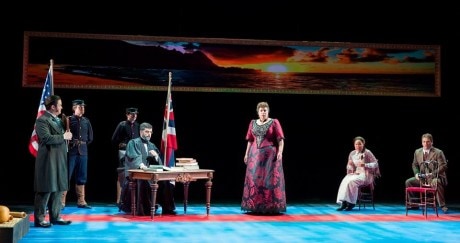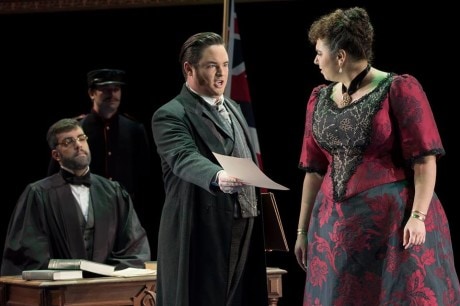Friday night, the Washington National Opera (‘WNO’) premiered a brand new opera, based on the life of the last sovereign in Hawaii, Queen Liliʻuokalani. Better Gods, directed by Ethan McSweeny, was commissioned through a WNO program called the American Opera Initiative. Started in 2012, WNO describes the program as “a comprehensive commissioning program that works to expand the American operatic repertory, to give WNO’s young artists the chance to collaborate with living composers and librettists on new works, and to make American opera more relevant to 21st century audiences.”

Created by Composer Luna Pearl Woolf and Librettist Caitlin Vincent, the opera tells the story of Hawaii’s last Queen. Queen Liliʻuokalani was the reigning monarch in Hawaii when the Island was ultimately annexed to the United States in 1898. Refusing to renounce her faith, the Queen fought to preserve the native culture of her people. Eventually though, the Queen was forced to choose to abdicate the throne, in order to save the lives of her supporters, and declare the United States to be the official governing authority.
The set design, by Daniel Conway, attempts to replicate the throne room in the Iolani Palace, in Honolulu, Hawaii. A beautiful panoramic view of the island is suspended above the set and establishes a sense of place. While, on the set vibrant reds and the use of several kahili, which are royal standards used to show status, lineage, and family ties. The kahili are said to be made of the long bones of an enemy king and decorated with the feathers from birds of prey and signify power from the divinities. The power and tradition of the room is perfectly stated and, as the show progresses and the Queen loses control of the throne, the kahili are slowly, inconspicuously removed from the stage illustrating the Hawaiian culture being systematically removed from any influence or role in the ruling government.
Woolf’s new and original composition uses Hawaiian instruments to add an audible authenticity to the story. Throughout the opera the nose flute, Kalaʻau (warrior sticks made from strawberry guava trees), and ʻIliʻili (stone castanets) amplify the sadness and desperation of the Queen to maintain Hawaii’s culture.
In addition to traditional instruments, Woolf and Vincent also incorporate Hawaiian songs and chants to aid in telling the story. Queen Lili’uokalani was herself a composer of songs and one of her most famous compositions, “Aloha ‘Oe” meaning “Farewell to Thee,” is referenced in the music. The song over-time came to represent the fall of the Hawaiian Kingdom, for many.
The Creation Chant is another Hawaiian original steeped in history and tradition. The chant tells of the creation of the world in one celestial night. At the start of the show The Creation Chant is first heard in Hawaiian and is gradually translated into English. The Queen explains that the world can forget so she translates the important chant to help ensure pieces of Hawaiian culture will not be forgotten. Simultaneously though, like the kahili, the chants evolution from Hawaiian to English demonstrates the slow transition away from Hawaiian culture.
The cast of this fascinating production are equally impressive. Queen Liliʻuokalani is played by mezzo-soprano Daryl Freedman. The Queen is proud and brave and resilient as she is seen declaring her will and demanding her power to be heeded. Then later in the opera, she is broken and defeated. The Queen collapses in the sand and conveys her anguish and frustration on what has been lost. The range and difficulty in the role is astounding and Freedman performs it masterfully.
Kahua (Ariana Wehr) is a role that is never quite clearly established. But whether she is a student or a maid, Wehr exudes an unwavering devotion to the Queen. A soprano, she sings mostly in Hawaiian as she works with the Queen to translate the Creation Chant. Wehr’s voice is clear and gorgeous, adding a sense of the majestic to the Hawaiian words as she sings them.
Lorrin Thurston (Rexford Tester) and Judge Albert Judd (Timothy J. Bruno) represent the American businessmen and government presence on the island. The tenor and bass, respectively, are forceful and demeaning to the Queen. Tester and Bruno imbue their characters with a pomp and self-righteousness that makes them perfectly appalling.
The character of James Miller, played by baritone Hunter Enoch, is the unfortunate pawn in the Thurston’s deceit. Writing for the Associated Press, Miller unknowingly reports lies to the states which sways public opinion away from the rightful Queen. Realizing his folly too late, Miller stands witness to the Queen’s undoing and laments.

And Robert Wilcox (Wei Wu) is the well-intentioned soldier who wants to fight to maintain control of Hawaii. Wu plays Wilcox’s devotion to the Queen, but his strong-minded nature compels him to go against the Queens wishes to refrain from fighting. It is this betrayal that leads to the Queen being charged with treason and imprisoned. The courtroom scene is an emotional experience as the Queen asks Wilcox “What have you done” and Wilcox in turn pleads with the Judge that Queen Lili’uokalani was unaware of his plans and should not be charged.
As one of the performers mentioned during the Question & Answer session after the performance, the overthrow of Hawaii and its annexation is completely neglected in our history books. Queen Liliʻuokalani’s story is one that needs to be told.
This fascinating and heart wrenching story of Better Gods is a production worth seeing. The touches of Hawaiian authenticity, and the tremendous strength of the performers, make the new fascinating and heart-wrenching Better Gods from the Washington National Opera a powerful experience.
Running Time: 6o minutes, with no intermission.
Better Gods ends its sold-out run tonight at The Kennedy Center’s Terrace Theater – 2700 F Street, NW, in Washington, DC. For future Washington National Opera performances, check their schedule.
RATING:





How wonderful that the true tragedy of the illegal overthrow of the reigning Queen of a sovereign independent country is being spread finally!
Not sure if the misinformation in this review is a result of the writers of the opera or the author of the review, but the insurgents were NOT American businessmen as we were all taught in school, but mostly white descendants of missionaries, born in Hawai`i, they were Hawaiian Kingdom subjects, however the biggest inaccuracy is the statement that Hawai`i was annexed, as there was never a lawful treaty of annexation, just a Joint Resolution in Congress which is merely a domestic law, and not an act which can acquire another independent nation. We are very happy the sad story is now being told, but wish the whole truth of the legal status of Hawaii’s independence under international law would also be stressed as well.
Mahalo nunui!